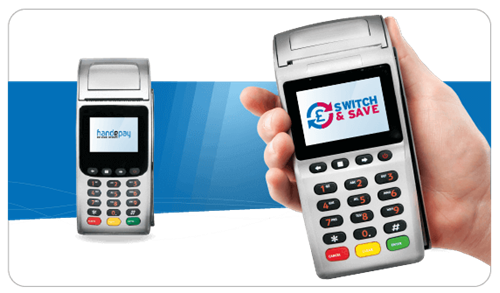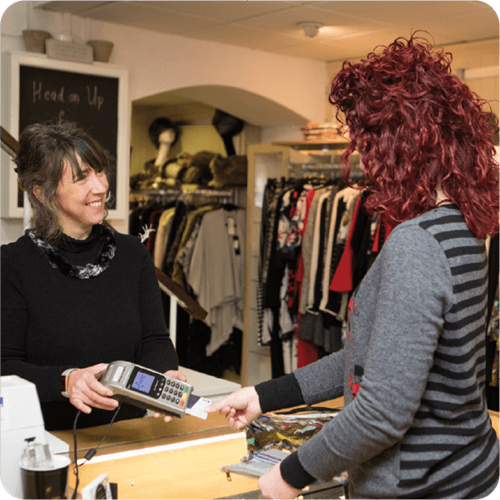What is a merchant account?
In order to start accepting card payments, your business needs a merchant account.
Just to be clear - it’s not a business bank account. The two are different things.
A merchant account enables you to process credit and debit card payments face to face, online, or over the phone if required - and there are plenty of providers out there who can help you set one up.
But first, before we get on to all that - we’re going to evaluate all things related to merchant accounts right here, starting with how the actual process works during transactions.
Quick Links:
> How does a merchant account work?
> Different ways to take card payments
> Types of merchant accounts
> Traditional vs aggregated merchant accounts
> How do you get a merchant account?
> How much does it cost to set up a merchant account?
> What are the benefits of taking card payments?
> Do I need a merchant account?

How does a merchant account work?
Unlike a business account, a merchant account isn’t designed to store all of the daily proceeds generated from card payments so to speak.
The merchant account holds the funds until the card payment is authorised. Once the payment has been authorised, the funds can then be settled into your business bank account after an agreed period of time. This is known as the ‘settlement period’, and can vary from one day to over a week.
To simplify things, here’s a broad overview of how a merchant account comes into play during card payments:
- Customer pays using their credit or debit card
- Payment data, including the customer’s card details, are sent from the card reader to the merchant account - held with the acquiring bank (the merchant’s business account)
- This information is then sent to the card issuer (Visa, Mastercard etc.)
- The card issuer then makes contact with the issuing bank (the customer’s bank account) to check whether the funds are available
- The issuing bank then confirms this with the acquiring bank
- The transaction is approved and finalised


Different ways to take card payments
With a merchant account, your business can start accepting a range of different types of card payments, including:
Face to face payments: the traditional card payment using a card terminal. This applies to both Chip & PIN and contactless payments.
Online payments: especially important if you’re an e-commerce business. This enables you to start taking customer not present (CNP) transactions via your website through a payment gateway.
Mail order and phone payments: self-explanatory, but again, applies to similar types of CNP transactions using a virtual terminal.
With all these different ways to accept card payments available to your business, the chance for growth is enhanced - and your customers will always appreciate the extra flexibility and accessibility when it comes to paying for your products and services.
Types of merchant accounts
Although a merchant account essentially performs the same function across the board, there are different types for different business needs.
Let’s explore some of the common merchant account terminology you may encounter:
Traditional merchant accounts
A traditional merchant account is likely to have the lowest costs as the risk of having a transaction returned is minimal.
This is geared towards retailers mostly - where the business only needs to take card payments face to face at the point of sale.
Internet merchant accounts
As the name suggests, internet merchant accounts (also known as IMA’s) apply to e-commerce businesses specifically.
As this type of merchant account is tailored towards CNP transactions, you will need to pay for either a payment gateway, virtual terminal or both to use it.
MOTO
MOTO stands for ‘mail or telephone order’ - and this type of account enables phone based and direct mail order debit and credit card processing.
Again, providers will usually take into account the customer-not-present element and lack of traditional face to face card reader equipment, which is likely to be reflected in the fees.
Aggregated merchant accounts
On the other hand, an aggregated merchant account is actually a service offered by a payment facilitator working on behalf of the acquiring bank.
This service is targeted towards smaller businesses.
In terms of how it all works, multiple small businesses are grouped together in the aggregate merchant account. All transactions get processed together - which can often mean lower rates for all retailers involved.
However, on the flip side to this - this often means that payments take longer to be processed. This is more common for Pay as you Go terminal types, or cheap devices that can be bought outright.
Dedicated, ISO merchant accounts
This is just another name for a traditional merchant account. And, the reason why it’s called a dedicated merchant account is that this is directly set up with the acquiring bank.
Unlike aggregated accounts, you have more control over the money paid to you - and can often negotiate better fees more tailored to the exact nature of your business.
High Risk
Unsurprisingly, this type of merchant account is for businesses that are classed as high risk.
Providers judge the ‘risk’ of a business based on a number of factors, including longevity, stability, type of industry, credit record, financial history etc. This type of merchant account therefore exists for those businesses that other providers consider too risky to get accepted for a merchant account.
However, businesses resorting to a high risk merchant account will usually be faced with larger transaction fees.




Traditional vs aggregated merchant accounts
As touched on above, the main difference between traditional and aggregated merchant accounts is the time it takes for your takings to be paid into your business bank account, once the provider has processed the payment.
With a traditional merchant account, the funds are deposited directly into your business account after a pre-agreed number of days. Known as the settlement period, this can be as soon as the next day, although the average is about three working days.
For an aggregated merchant account, this settlement period can be a lot longer, as takings from multiple merchants are first pooled together into one shared account. There is less control over the settlement timescale, which can damage your cashflow.
That being said, it’s arguably easier for businesses to get accepted for an aggregated account. When looking to set up a traditional, dedicated merchant account, businesses are often subject to more rigorous checks to calculate their risk - particularly from a creditworthiness perspective.
How do you get a merchant account?
Now you know how a merchant account works and the different types available, you’re probably wondering how you go about setting one up?
Well, before you start shopping around - you might want to bear the following steps in mind:
- Consider the different credit card issuers you want to work with: Visa and Mastercard are the two most commonly used, so you’ll want to make sure you get a good rate for these at the very least
- Consider the payment model: do you want to accept payments from customers at your premises, online or over the phone?
- Consider your turnover and credit background: the processing history of your business has a bearing on the rates you’ll be offered, so it’s good to get a clear idea of this beforehand
- Set up your business bank account - if you haven’t already, you need to set one up to be able to accept card payments
- Gather all the documents required and submit an application form - or get a free quote directly from your chosen provider. Also, don’t be scared to negotiate!

How much does it cost to set up a merchant account?
The different credit card processing fees associated with different merchant accounts depends on a number of factors - from the type of account to the provider themselves.
Here’s a general overview of the types of fees you may encounter:
Merchant account fees
Broadly speaking, merchant account fees could be broken down into three categories:
- Set-up fees: not all providers charge these, but make sure to look out for them
- Monthly fees: for things like card terminal rental, although this depends on what type of merchant account you set up
- Transaction fees: this includes the standard rates that youpay for every card transaction you process
- One-off fees: set-up fees could possibly fall into this category, but other, less-obvious examples may include installation fees
What are the benefits of taking card payments?
Opening a merchant account opens you up to accepting card payments - for which there are a range of obvious benefits.
Needless to say, having the ability to take card payments drives revenue and increases growth.
You’re providing your customers with even more ways to pay for your goods and services, and in return you’re not only enjoying the sales, but also living and breathing the values of a modern and accessible business.
UK Finance reports that 47% of all payments in the UK were made by card in 2018 - and that figure is expected to grow to 61% by 2028.
So, having the ability to take card payments is a no-brainer for businesses looking to the future.


Do I need a merchant account?
To reiterate the first sentence on this page - if you want to start taking card payments, you must set up a merchant account
If you want to know more about merchant accounts - we’re more than happy to chat. Perhaps you’re already set up with a provider, but looking to switch?
Either way, feel free to get in touch to find out more about your options.

